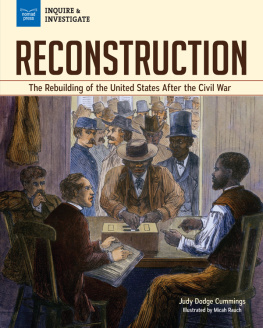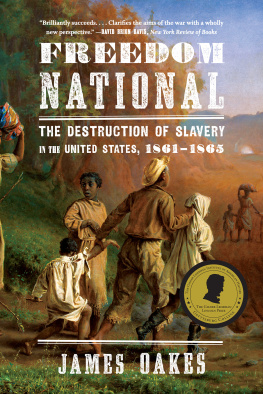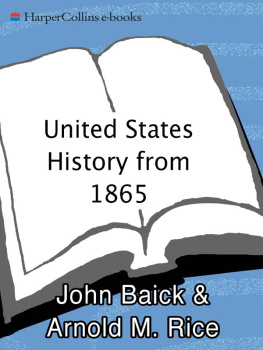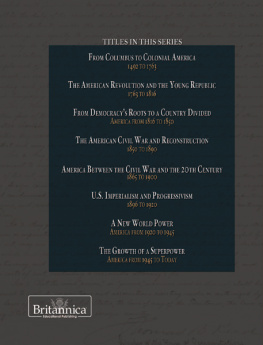Robert J. Cook - Civil War Memories: Contesting the Past in the United States since 1865
Here you can read online Robert J. Cook - Civil War Memories: Contesting the Past in the United States since 1865 full text of the book (entire story) in english for free. Download pdf and epub, get meaning, cover and reviews about this ebook. year: 2017, publisher: Johns Hopkins University Press, genre: Politics. Description of the work, (preface) as well as reviews are available. Best literature library LitArk.com created for fans of good reading and offers a wide selection of genres:
Romance novel
Science fiction
Adventure
Detective
Science
History
Home and family
Prose
Art
Politics
Computer
Non-fiction
Religion
Business
Children
Humor
Choose a favorite category and find really read worthwhile books. Enjoy immersion in the world of imagination, feel the emotions of the characters or learn something new for yourself, make an fascinating discovery.

- Book:Civil War Memories: Contesting the Past in the United States since 1865
- Author:
- Publisher:Johns Hopkins University Press
- Genre:
- Year:2017
- Rating:4 / 5
- Favourites:Add to favourites
- Your mark:
- 80
- 1
- 2
- 3
- 4
- 5
Civil War Memories: Contesting the Past in the United States since 1865: summary, description and annotation
We offer to read an annotation, description, summary or preface (depends on what the author of the book "Civil War Memories: Contesting the Past in the United States since 1865" wrote himself). If you haven't found the necessary information about the book — write in the comments, we will try to find it.
Robert J. Cook: author's other books
Who wrote Civil War Memories: Contesting the Past in the United States since 1865? Find out the surname, the name of the author of the book and a list of all author's works by series.
Civil War Memories: Contesting the Past in the United States since 1865 — read online for free the complete book (whole text) full work
Below is the text of the book, divided by pages. System saving the place of the last page read, allows you to conveniently read the book "Civil War Memories: Contesting the Past in the United States since 1865" online for free, without having to search again every time where you left off. Put a bookmark, and you can go to the page where you finished reading at any time.
Font size:
Interval:
Bookmark:
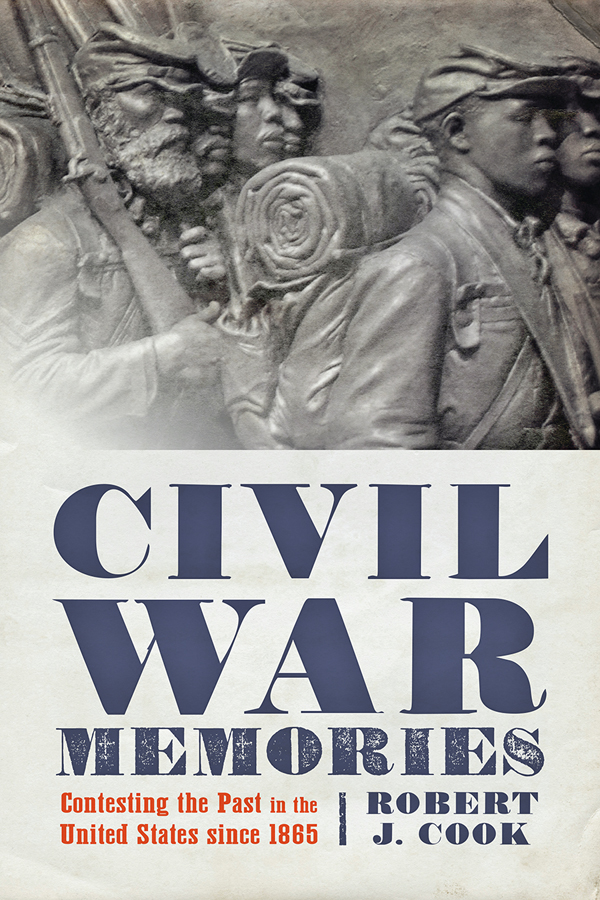
Civil War Memories
CIVIL WAR MEMORIES
Contesting the Past in the United States since 1865
ROBERT J. COOK
University of Sussex
Johns Hopkins University Press
Baltimore
2017 Johns Hopkins University Press
All rights reserved. Published 2017
Printed in the United States of America on acid-free paper
246897531
Johns Hopkins University Press
2715 North Charles Street
Baltimore, Maryland 21218-4363
www.press.jhu.edu
Library of Congress Cataloging-in-Publication Data
Names: Cook, Robert J., 1958 author.
Title: Civil War memories : contesting the past in the United States since 1865 / Robert J. Cook.
Description: Baltimore : Johns Hopkins University Press, 2017. | Includes bibliographical references and index.
Identifiers: LCCN 2017004274 | ISBN 9781421423494 (hardcover : alk. paper) | ISBN 9781421423500 (electronic) | ISBN 1421423499 (hardcover : alk. paper) | ISBN 1421423502 (electronic)
Subjects: LCSH: United StatesHistoryCivil War, 18611865Influence. | United StatesHistoryCivil War, 18611865Social aspects. | Collective memoryUnited States.
Classification: LCC E468.9 .C559 2017 | DDC 973.7/1dc23
LC record available at https://lccn.loc.gov/2017004274
A catalog record for this book is available from the British Library.
Special discounts are available for bulk purchases of this book. For more information, please contact Special Sales at 410 -- 6936 or specialsales@press.jhu.edu.
Johns Hopkins University Press uses environmentally friendly book materials, including recycled text paper that is composed of at least 30 percent post-consumer waste, whenever possible.
To the memory of Derek Bevan
CONTENTS
ACKNOWLEDGMENTS
Anyone foolhardy enough to write a book of this scope must owe a fistful of debts, not only to giants in the field of Civil War memory like David Blight and Caroline Janney but also to those strangers, friends, and family members who have contributed in myriad ways to a research project of long duration. All scholars require money and time to undertake their work successfully. On this score I gratefully acknowledge the assistance provided by a British Academy / Leverhulme Senior Research Fellowship and a term of institutional leave from the University of Sussex that, together, gave me a valuable year and a half away from teaching to write the book. I thank especially David Brown, Adam Gilbert, Patrick Kelly, and two anonymous readers for Johns Hopkins University Press for their probing comments on an initial draft of the manuscript. It goes without saying (but I am constitutionally bound to say it) that, in spite of their heroic efforts, any mistakes in the text are all my own.
Generous friends across the United States provided me with accommodation and psychological support on research trips across the Atlantic, especially (in strictly alphabetical order) Roy Adolphson, Claire Awtrey, Jennifer Awtrey, Julianne Borton, Joy Harvey, Barbara Holmlund, and John Zeller. I thank John Neff and Jarod Roll for inviting me to test out some ideas on Jefferson Daviss death at a public lecture at the University of Mississippi in November 2014. I am grateful as well to Bob Jones of Louisville for sharing his experiences as a Civil War reenactor and to Jennifer Ford, head of the Department of Archives and Special Collections at Ole Miss, who not only provided me with help on my memorably cold visit to Oxford but also enabled me to identify Dudley McEwan Featherston as the likely author of an anonymous Lost Cause oration in the university archives. Thanks also to the Chautauqua County Historical Society for permission to publish from the Albion W. Tourge Papers; to my efficient editors at Johns Hopkins University Press, Elizabeth Demers and Meagan Szekely; to my expert copy editor, Beth Gianfagna; to all my supportive colleagues in History and American Studies at the University of Sussex; and especially to my parents, Margaret and John.
My wife, Andrea Greengrass, has had to live with this project on a daily basis. I thank her for her skilled work on the index but most particularly for her love and support over the years. This book is dedicated to the memory of her late father, who is greatly missed by me, Andrea, Martha, Daniel, and all our family.
Civil War Memories
Introduction
On the evening of June 17, 2015, Emanuel AME Church in Charleston, South Carolina, was hosting one of its regular Bible study classes. Widely known as the oldest African American congregation south of Baltimore, Mother Emanuel was steeped in history. In 1822, one of its cofounders, Denmark Vesey, had organized an abortive slave revolt that was brutally suppressed by the citys white authorities. Todays parishioners were far too welcoming to question why a young white man, slight of build with blond hair, had chosen to join them that night. But after an hour of rich discussion and biblical exegesis, they were shocked when the stranger pulled out a gun. Somehow, twenty-six-year-old Tywanza Sanders summoned the courage to try to persuade him to lower his weapon. You dont have to do this, said the young African American. The man had no intention of aborting his mission. Yes, he replied. You are taking our women and taking over the country. Then he began firing with lethal purpose. Within seconds, six women and three men, including Sanders and the churchs respected pastor, Clementa C. Pinckney, were dead or dying. The cold-blooded killer strolled out into the warm night air, got into his car, and made good his escape.
Coming as it did at a time of heightened racial tension in the United States, generated by several high-profile incidents in which black men had been killed while being apprehended by police, the massacre triggered bitter responses
The sickening events at Mother Emanuel constituted one of the deadliest race hate crimes in modern American history. The suspect, Dylann Storm Roof, was soon arrested in North Carolina and returned to Charleston.
The Charleston murders initiated a wider debate in the United States about displays of the Rebel battle flag. The fierce public response to the massacre impelled major corporations such as Amazon, eBay, Sears, and Walmart to announce that they would no longer sell Confederate-flag merchandise. The battle flag, said one corporate representative, had become a contemporary symbol of divisiveness and racism.
The public conversation quickly extended to other reminders of the proslavery Confederacy. Southern communities in particular were divided by debates over whether Rebel street names should be altered and whether Confederate statues erected in the late nineteenth and early twentieth centuries should be removedall in the pursuit of better race relations in the present. In August 2015, the University of Texas at Austin responded to pressure from stu
White conservatives were divided in their response to these developments. Gerald Warner, a commentator on the right-wing Breitbart website, accused opportunistic leftists of using the Charleston massacre to further their agenda of cultural genocide against conservatism, tradition, and the South. Now, they feel, is the time to airbrush out of history every tradition that is an obstacle to their new, rootless, alien society based on intolerant political correctness. Warner exhorted those who opposed the culture warriors of the left to flaunt the battle flag: Hoist it high and fly it with pride, it proclaims a glorious heritage.
The charged public response to the Charleston slayings highlighted the continuing impact of the Civil War on American life. This book explains why this brutal industrial war has been long remembered in the United States. This study confirms the wisdom of Halbwachs insights into what he called collective memory by demonstrating how socially constructed autobiographical memories helped to feed powerful group memories of the Civil War. It also shows how these group memories combined with other factors such as interparty competition and racial strife to forge consolidated, ideologically driven grand narratives that survived the passing of the wartime generation.
Font size:
Interval:
Bookmark:
Similar books «Civil War Memories: Contesting the Past in the United States since 1865»
Look at similar books to Civil War Memories: Contesting the Past in the United States since 1865. We have selected literature similar in name and meaning in the hope of providing readers with more options to find new, interesting, not yet read works.
Discussion, reviews of the book Civil War Memories: Contesting the Past in the United States since 1865 and just readers' own opinions. Leave your comments, write what you think about the work, its meaning or the main characters. Specify what exactly you liked and what you didn't like, and why you think so.

